Leadership shake-ups raise fears of a stall in Shanxi city’s drive to remake itself
Many residents are now questioning whether an ambitious project to remake the ancient quarter of Datong, in Shanxi Province, will be finished at all. Beginning in 2008, the city's former mayor commissioned a project in which much of the city's oldest district was to be renovated or rebuilt. But the process has slowed following his transfer to another city. Even worse, another high official in Datong was recently placed under investigation, part of a broader shake-up of Shanxi officialdom.
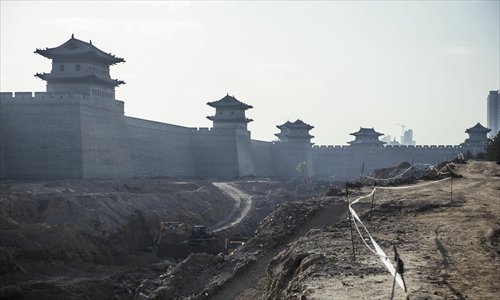
Construction for a moat and gardens outside the north wall of Datong's old city progresses slowly. Photo: Li Hao/GT
For over six months, Zhi Wenyi waited for workers to come and clean up the rubble in front of his house.
Zhi, a retired worker and now a landlord near the drum tower in the old city of Datong, Shanxi Province, sits in front of his door every day and watches people go by his narrow hutong. He, like many of his neighbors, is feeling the effect of a project to renovate and preserve the old city.
In 2008, following former mayor Geng Yanbo's ascension to office, a plan was put forth to preserve the old city. The plan included building brick walls to surround and protect the old city walls, renovating as well as rebuilding older buildings in the city and building parks and other green spaces around the new walls.
The existing old city in Datong was first established in AD398, during the Northern Wei Dynasty. The walls were reinforced during the Ming Dynasty in 1372. But most parts of the walls were destroyed during centuries of war, with only about half left standing before renovation project started.
At the time media outlets reported that the project would be finished by the end of 2012. By then, all modern buildings would be moved out of the old city, only leaving the ancient relics inside. In Geng's vision, Datong would attract 3 million tourists a year once it opened.
But following Geng's transfer to another city in 2013, many feared the project might slow down or even stall. The secretary to the city's Party committee was also recently put under investigation as part of the Shanxi officialdom shake-up. With that, the future of the renovation project came into question once more.
In China, many construction projects are left unfinished due to the transfer or dismissal of officials who initiated them. Experts suggest giving officials' responsibility across the arc of their careers as a way to deal with this issue.
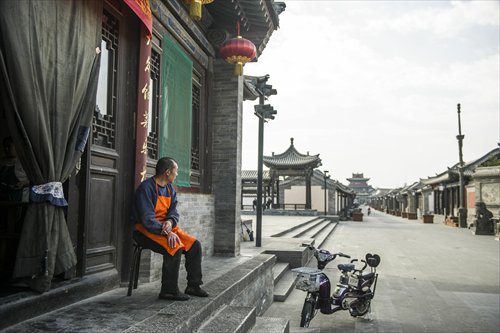
A restaurant owner sits outside his shop in the nearly-deserted drum tower commercial district. The buildings and streets in the area have been rebuilt in the classic style used in the old city. Photo: Li Hao/GT
Rebuilding a city
"The construction project has affected the people here a great deal," Zhi told the Global Times. He says that he has lost much more than he has gained from Geng's grand vision.
He once lived outside the south gate of Datong's old city wall. After the renovation project started, the houses there were demolished, with the residents each compensated around 10,000 yuan ($1,635) to find new housing, according to Datong Daily, a price many expressed discontent with.
Right now, the old city is still full of construction sites. Piles of rubble surrounded by blue fences are a common sight, including near the city center, where the mansion of a prince is being rebuilt.
A woman surnamed Zhao who lives near the city center told the Global Times the government talked about tearing down her house as part of the construction. But she doesn't know when that might be. In the meantime, just like Zhi, she lives among the rubble.
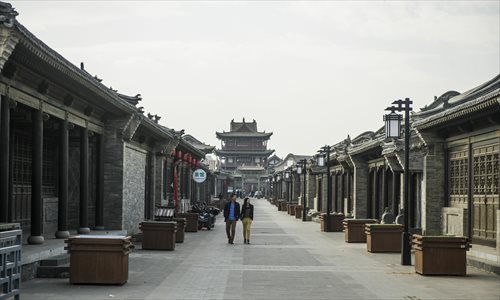
Two pedestrians wander in Datong’s Drum Tower Commercial District on October 22. The district was reconstructed in the same style as the old houses and temples that line it, but business has proven poor so far for its shops and restaurants. Photo: Li Hao/GT
Even those areas that are finished are largely deserted. One street near the drum tower was reconstructed in the same style as the old houses and temples that line it. It was designed to be a commercial district, but many of the shops and restaurants on the street are being sublet because of poor business. During a recent visit by the Global Times, only a few tourists and pedestrians wandered through the open street.
The renovation plan included a new district where residents of the old city were to be relocated. But the construction raised questions of a "ghost city" as well.
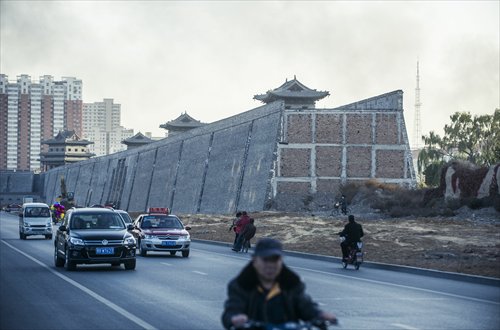
Traffic passes a section of newly built west wall of the old city. Photo: Li Hao/GT
An unfinished story
While many residents have complained that construction has affected their lives and cost them a fortune, experts have also criticized the project for its unprofessional design. Wang Guixiang, an architecture professor at Tsinghua University, told the Global Times that the so-called renovation of the old city was "sheer nonsense."
"The existing temples and architecture have lost their value now that they've been mixed in with fake, rebuilt ones," he said.
He thinks, since most of the architecture in the old city was either damaged or completely destroyed, the Datong government should have kept the city as it was and moved commercial districts outside the old quarter of the city, instead of replicating cultural relics and building shopping streets in the same style.
However, Liu Yuan, a staff member at the Datong Cultural Relics Bureau, thinks otherwise. She told the Global Times that the project is designed with good intentions.
"From the perspective of protecting cultural relics, there is no question that the direction is right," she said.
Aside from questions of preservation, the construction process has also come in for questioning. Geng was transferred to a post as mayor of Taiyuan, a larger city nearby, in 2013. Afraid that Geng's overhaul of their city might be left incomplete, Datong residents marched through the streets during the Spring Festival last year, begging Geng to stay.
When the Southern Weekly interviewed Geng in 2012, he had told the paper that the construction wasn't a show staged for political purposes because "it will be finished." But nothing was said after he transferred.
The new mayor, Li Junming, promised the project will be finished in time.
Since the construction doesn't show signs of wrapping up anytime soon, some Datong residents are starting to wonder. Zhi said he remembers the slogan used to promote the project several years ago was "three years to see a change." But it's been five years since then, with no end to the work in sight.
Much of the concern centers on the state of Datong's finances. According to the Chinese Business Journal, since 2008, 50 billion yuan has been invested in rebuilding the old city, putting Datong's government more than 10 billion yuan in debt.
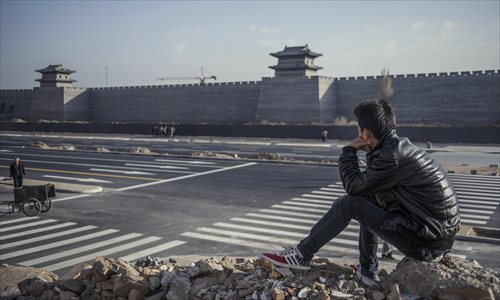
A young man sits on a mound of rubble outside the north wall of the old city. Photo: Li Hao/GT
Shake-ups in officialdom
Feng Lixiang, the secretary of Datong's Party committee, was put under investigation last week, bringing the construction program in for scrutiny once again, and reinforcing concerns that the project may remain unfinished.
Feng's investigation may have come as part of a larger shake-up of officialdom in Shanxi, Datong's province, where many officials have been named in corruption probes and either investigated or replaced this year in the wave of anti-corruption campaign by the currant administration.
Zhi and other residents of the old city expressed their concerns to Global Times, saying they don't even know whether the project can be carried out now.
In China, the departure of high level officials frequently translates to construction work being left unfinished.
One example is the construction of a new housing district and shopping center in Luoyang, in Henan Province. The project started in October 2004 under the command of Sun Shanwu, the former secretary of the city's Party committee in Luoyang.
In 2006, Sun was forced to step down. He was then investigated for discipline issues and later charged with receiving millions of yuan in bribes from developers. Afterwards, the project fell apart. Another more famous case was a project to divert rainwater to prevent sewage overflow in Nanjing, the capital of Jiangsu Province. The project was brought to an immediate halt only a few days after former Nanjing mayor Ji Jianye was dismissed for "suspected serious violations of discipline."
Ji was nicknamed "Mayor Bulldozer" for his work managing construction and infrastructure projects in the city.
These projects were along the same line as Datong's. Wang, the Tsinghua professor, said that Datong's construction project is facing a dilemma because it was the pet project of certain officials and was begun without thorough preparatory research.
Zhang Xin, a professor at the School of Public Administration and Policy of the Renmin University of China, told the Global Times that such incomplete projects conducted by government officials are a distinctly "Chinese" phenomenon.
"It's easy for officials to take bribes from large projects. The bidding process, for example, is not as open and transparent as it is abroad," he said.
But he says the situation might be improving. At the Fourth Plenum of the 18th Central Committee of the CPC, which just concluded on Thursday, it was declared that a mechanism will be put in place giving officials lifelong accountability for major policy decisions.
This is the direct answer to such unfinished projects, Zhang said. The officials will be responsible even after they retire or transfer, which may result in more clearly thought out project plans from now on.
Liu, of the Datong Cultural Relics Bureau, denies that the project will be suspended. She acknowledges that it might slow due to a shortage of funds, but says that it will be finished sooner or later.
But many residents of Datong's old city feel as if they are being forced to live on promises. Many are waiting to see what will happen next, Zhi said. He, for one, is resting his hopes on the next set of government officials to come to power.
"I've waited for a year and nothing has changed. This seems to be the only hope for me," he said.
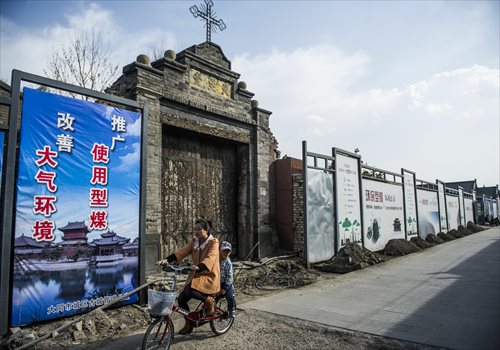
A woman and a boy ride past the gate of an old church to be renovated in Datong, Shanxi Province, on October 22. The city's former mayor Geng Yanbo commissioned a project in 2008 in which much of the city's oldest district was to be renovated or rebuilt. But the process has slowed following his transfer to the provincial capital of Taiyuan in 2013. Photo: Li Hao/GT
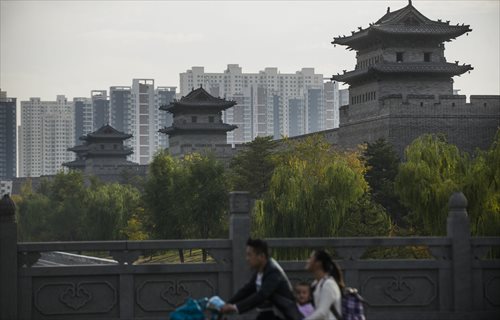
Residents pass Datong’s old city wall with modern residential buildings in the distance on October 22. Photo: Li Hao/GT
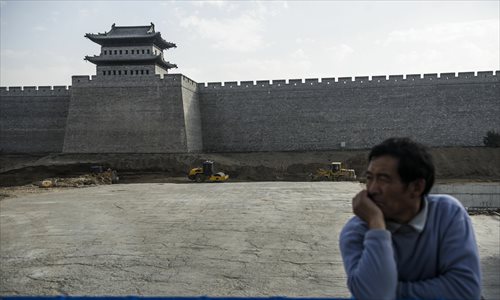
A resident near the construction site for a moat and gardens outside the north wall of Datong’s old city on October 22. The construction project has slowed, with only few excavators at work on the site. Photo: Li Hao/GT
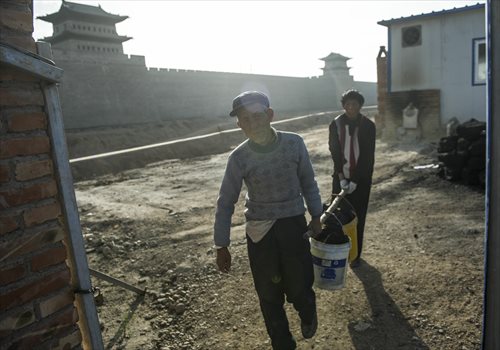
Two workers carry two bockets on the construction site for a moat and gardens outside the north wall of Datong’s old city on October 22. Photo: Li Hao/GT
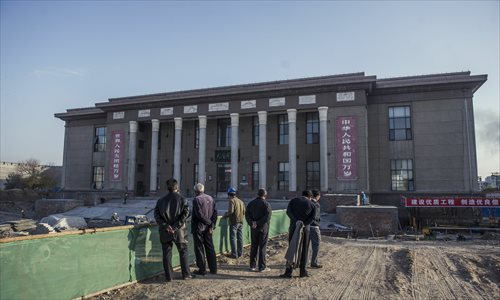
Residents visit the Datong library, which is under renovation, near the west wall of Datong’s old city on October 22. Photo: Li Hao/GT
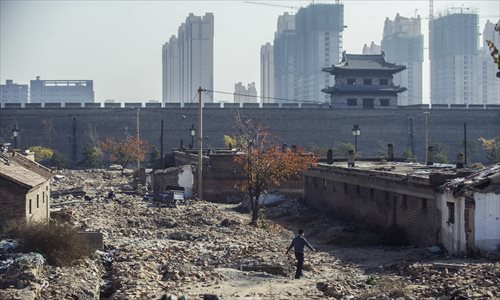
A resident walks among the rubble of demolished homes near the east gate of Datong’s old city wall on October 22. Photo: Li Hao/GT
Newspaper headline: Old city, new problems